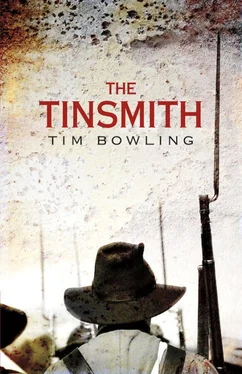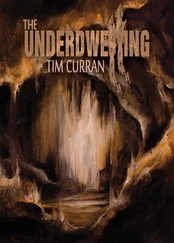“If he’s here, I’ll kill him.” Henry Lansdowne’s face shone pale in the starlight.
Suddenly Anson saw a trail, clear and direct and mysterious as the salmon’s trail from sea to river. It was lit with bloodshine and Dare walked it, and would keep walking it until his breath came no more and perhaps beyond that. It didn’t matter how it was walked, in what name—justice, truth, faith—Dare would walk and his feet would be covered in blood, his or others’, and that hardly mattered either.
Anson, however, still had a useful service to perform.
“Your brother’s recovering,” he said and rose. “But I must return to your niece. We’ll have to tend to this later.”
Henry Lansdowne nodded. Together they turned from the corpse of the old Chinese and walked with intent toward the river. They had not gone twenty paces before Lansdowne stopped and whirled around, his gun aimed in the direction of the black woodlot.
“Dare!” he shouted. “Come out and show yourself!”
There was no response.
Anson strained to make out the thousand tense faces between the trees, his body went rigid waiting for the burst of noise and motion.
Lansdowne lowered his gun very slowly. “I do not doubt,” he said in a level voice, “that he would shoot me in the back. Or…”
His jaw dropped and his eyes widened. He whirled around to the west and stared downriver.
Anson understood what the “Or” implied, but he could no longer be sure if the implication was unfounded. Henry Lansdowne had killed Dare’s Chinese, a man who’d clearly been in Dare’s employ long enough for a certain loyalty to accrue. And yet, to mete out vengeance on a slave owner who’d destroyed all you’d ever known of family, to so lose yourself in that act of vengeance to be reduced to savagery, was a particular brand of justice. Anson knew that Dare was not that same man—twenty years would cool any blood, white or black, but he couldn’t be sure how Dare would respond to the murder of the Chinese.
Henry Lansdowne obviously had no such doubt. He began to run toward the river.
Anson hesitated.
“John?” he said, facing the woodlot. “Are you there?”
He hoped for a response without really expecting one. The air bristled. Seconds passed. When Anson finally turned away, he saw that the darkness had already swallowed Lansdowne’s figure. There would be no catching him.
The smoke of the campfire had vanished. Near the ashes, a body lay under the faint stars, on the cool grass, with the dead salmon’s open-eyed vision on its face. It was there because of Dare, regardless of right and wrong, good and evil. It had been there since Antietam and it was never going to be buried. All the bones in Anson’s body felt the ache of the knowledge—it was like a dull saw blade scraping the memory off his skeleton.
Clutching his side as he ran, he hoped he could find an Indian to row him downriver again.
• • •
At first the red glow in the distance looked like nothing more than a soldier’s campfire on a hillside, a flicker of light in the surrounding dark. But as the skiff drifted in to the Chilukthan wharf, the glow became a fierce ball of crackling flame. Then Anson heard the frantic shouts of men. But it wasn’t until the skiff had landed and he was rushing along the dike that he connected Henry Lansdowne’s open-jawed panic with the fire. To connect the two, however, was not the same as accepting the cause and effect. Anson had seen the cannery in full operation, had seen the careless work in the boiler room where the hot ashes were not hosed down as regularly as they should have been. Even so, he was not a fool, not quite; he recognized that the timing was a damnation not even a friend of Dare could dismiss lightly.
When Anson reached the cannery, the heat was intense even though the fire had been contained to one corner of the building. Madly, the processing continued inside. Anson watched in disbelief as the dark, hunched figures of the Indian women continued to slice away at the silver fish even as the smoke and flames crept closer. Outside, a long line of men and women—Chinese and Indian mostly, but also some whites who oversaw the cannery operations—had formed a bucket brigade down to the river. Each person stood about twenty feet from his neighbour and raced two buckets of sloshing water up the line where they were thrown on the flames by Henry Lansdowne himself. The Englishman hurled each bucketful with such ferocity that he might have been a devil driving a pitchfork into sinning flesh.
With his arm over his face, Anson ran forward.
Lansdowne did not pause. The fire glow in his beard made him look as if he’d been feeding on a piece of bloody meat. He shouted, “Get a bucket, man! Hurry!”
Anson staggered away from the heat. He found a place in the line and reached for the handles of the buckets. The Indian who handed them to him seemed to find nothing unusual in the emergency, but the man who burst out of the darkness below, his face greasy and red, was shouting as if on fire.
“Move it! Move it, there! For God’s sakes, hurry!”
It was Thomas Lansdowne. His blackened sling hung loosely from him as he ran. Anson opened his mouth to protest, but the next buckets were in his hands and the person above him was urging him on. With a heave of his sore shoulders, he set to the task.
To Anson’s amazed relief, the bucket brigade proved effective. After what seemed like hours, the fire was out, but not before the cannery crew had been forced to flee. Only the use of the steam pumps, in fact, had saved the building.
The riverbank hushed. Anson stood beside a barrow of salmon, the top layer of which was charred. Little flecks of red ash floated past him. He watched one rise until it disappeared against the stars. The night quickly recovered its rhythm. The river chewed almost docilely against the bank, an owl hooted somewhere beyond the smoking cedar of the ruined section of the cannery. Men and women trod heavily through the restored rhythm, their heads down. A few pairs of gumboots sloshed through the inches of water on the cannery floor. Buckets were strewn about like severed fish heads. A man kicked savagely at one. It was Thomas Lansdowne. His brother stood at his side, sniffing disgustedly at the smoking char. Anson did not have to approach them. In unison, they turned to him, and Henry Lansdowne said, “Now he’ll be running. At least he’d better be. And if he’s intelligent at all, he won’t stop.”
He never has stopped, Anson reflected, not since Antietam. Now Dare was gone, plunged somewhere into that darkness of the earth from which he had emerged, and would emerge again, with or without the imprimatur of goodness bestowed upon him by the diminishing belief of one for whom almost twenty years was enough of a church. But if the bricks had collapsed, the beams might yet remain; if it could be done, Anson vowed to transfer what belief he still possessed to where it might prove of greater benefit. There was no point in talking to Thomas Lansdowne about his arm; the man would not listen to him now. Without a word, Anson turned his back on the cannery and set out to resume his vigil at the child’s bedside.
As he neared the house, however, the sudden snorted breath of a horse startled him. But Anson did not see the animal; its hoof beats struck the ground almost immediately and died away in the opposite direction, to the south. When Anson reached the veranda stairs, a strange whimpering sound stopped him before he could fully absorb the idea of connecting Dare with the horse. He knelt and peered into the close, warm darkness beneath the stairs. The smell of blood and wet fur flowed up. It was the Lansdownes’ dog. She’d given birth to at least six puppies; he could hear them suckling, hear the mother licking and breathing. One of the pups was curious, already pushing its nose into the greater world. Anson reached out his hand and collected the soft creature. Then he stood and gazed in the direction the horse had gone.
Читать дальше












